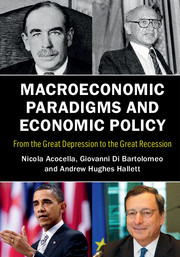Book contents
- Frontmatter
- Dedication
- Contents
- List of figures
- List of tables
- Preface
- Acknowledgments
- 1 Introduction
- Part I The emergence of alternative paradigms
- Part II Institutions and policies
- 7 Central banking
- 8 Fiscal regimes and fiscal policies
- 9 Further fiscal policy challenges
- 10 Conflicts and cooperation in the labor markets
- 11 Fixed exchange rates: the age of tempered liberalism
- 12 Free to float: the age of neoliberalism
- 13 A fragile European construction: the perils of incomplete coordination
- 14 Taking stock: the end of the ride or the beginning of a new one?
- Bibliography
- Index
7 - Central banking
from Part II - Institutions and policies
Published online by Cambridge University Press: 05 June 2016
- Frontmatter
- Dedication
- Contents
- List of figures
- List of tables
- Preface
- Acknowledgments
- 1 Introduction
- Part I The emergence of alternative paradigms
- Part II Institutions and policies
- 7 Central banking
- 8 Fiscal regimes and fiscal policies
- 9 Further fiscal policy challenges
- 10 Conflicts and cooperation in the labor markets
- 11 Fixed exchange rates: the age of tempered liberalism
- 12 Free to float: the age of neoliberalism
- 13 A fragile European construction: the perils of incomplete coordination
- 14 Taking stock: the end of the ride or the beginning of a new one?
- Bibliography
- Index
Summary
Governments, central banks, and money
At the beginning of the nineteenth century, David Ricardo expressed his concerns about entrusting governments with the power to issue paper money. He argued that a government would almost certainly abuse this power and pointed out that central banks must be governed by individuals who should be “entirely independent” of the government, and who “should never, on any pretence, lend money to the Government, nor be in the slightest degree under its control or influence” (Ricardo, 1824). Ricardo anticipated two milestones of the modern theory of central banking: (1) the need to make central banks independent from government and (2) a general prohibition on central banks financing public expenditure.
The rationale of Ricardo's point of view was related to the general habit of kings to finance their Royal Expenditures by printing money without accounting for the consequences of this source of revenue.
The perverse linkage between political power and the absolute sovereignty over printing money eased with the emergence of an independent nominal anchor in the Gold Standard. As a result, at the end of the nineteenth century, due to the massive liberalization of capital movements implied by this first wave of the globalization process, central banks reached a high degree of independence from the government.
After World War I, the Roaring Twenties, and the recovery from the restrictions of a wartime economy, the end of the globalization process imposed wage and price rigidities that contributed to an undermining of the gold standard system. The fall of globalization in the 1930s became the principal threat to financial stability and economic prosperity in a world that was now without well-defined international rules.
The consequent Great Depression led many governments to nationalize their central banks since, as monetary authorities, they had suffered a general loss of public trust. As institutions, they had shown themselves unable to combat the new phenomenon of a major global recession, and indeed had probably helped to make it worse (Foreman–Peck et al., 1992).
The United States had also begun a debate about nationalizing the Fed at this time but ended up with a compromise that strongly reduced the central bank's independence from the government.
- Type
- Chapter
- Information
- Macroeconomic Paradigms and Economic PolicyFrom the Great Depression to the Great Recession, pp. 129 - 160Publisher: Cambridge University PressPrint publication year: 2016



